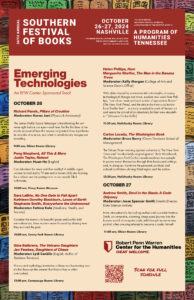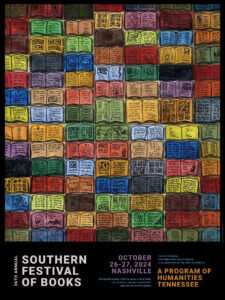Authors Talk Emerging Technologies
Fun fact: There were just 66 years between the Wright Brothers’ first powered, controlled flight in 1903 and Neil Armstrong walking on the moon in 1969.
Humans are in a hurry.

Recently, I heard someone on a podcast describe their experience of taking a driverless Uber. Every time I log onto any device, some sort of AI companion pops up, promising to make my workload easier. This week, I read an article about how the school system in Nevada used AI to formulate how many students truly are at risk in the education system, and adjusted funding accordingly.
All of this has happened gradually until, suddenly, it’s right now. What does the type and pace of emerging technologies mean to humans– to our minds, spirits, daily lives, and relationships? Can we keep up enough to know what’s “good” and “bad” for us and for our planet?
It is within the context of the rapid change that is the hallmark of human existence that we are pleased to stop and explore some of these questions in our annual themed track of sessions at the Southern Festival of Books, called Emerging Technologies and the Human Experience. We are honored as always to present the track in partnership with the Robert Penn Warren Center for the Humanities at Vanderbilt University.
The sessions welcome authors of multiple genres who explore technological innovation and its impacts on human flourishing and futures across time. From the printing press to the internet, electricity to quantum mechanics, steam engines to AI: What can humanistic inquiry tell us about the meanings and legacies of these and other technologies? What do emerging technologies reveal about who we are – and what and who we value (and don’t)?

We will be hearing from scientist Richard Panek, an authority on the James Webb telescope, which brings us astounding images of the universe. Author Andrew Smith will decode coding, a foundational issue for the computer-dependent world in which we live.
The New York Times columnist Carlos Lozada studies political memoirs and self-constructed images, and how traditional media, social media, and the democratization of information affects how we perceive our elected officials. And in fiction, we’ll meet writers like Peng Shepherd, Justin Taylor, Gina Balibrera and more, all of whom are taking today’s sometimes unstabling newness and writing it into the fiction of the future we’re all making together.
The Southern Festival of Books takes place Oct. 26-27 at Bicentennial Mall State Park in Nashville. Presented by Humanities Tennessee with tremendous community support, it is entirely free, and more information is available at: sofestofbooks.org. We hope you will join us!

Serenity Gerbman has been Director of Literature & Language programs at Humanities Tennessee since 2001, overseeing the Southern Festival of Books: A Celebration of the Written Word and other literary programs. She has served on review panels for the National Endowment for the Arts Big Read program and for the SouthARTS literary arts division. She is a past nominee for the Athena Award as a representative of the Women’s National Book Association. Serenity received a Bachelor’s degree in Liberal Arts from Middle Tennessee State University, and lives with her daughter in Murfreesboro.